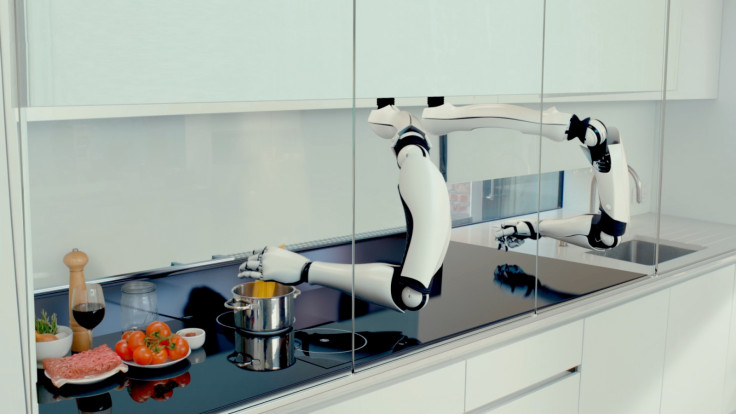Robotic chef can cook Michelin star food in your kitchen by mimicking world's best cooks
A smartphone-controlled robotic chef that can cook world-class food using recipes downloaded from an online store sounds like pure science fiction - but the robot is real, will go on sale in 2017 and just made me a crab bisque.
It is hard to put into words exactly how much the Moley robotic chef feels like it is from the future. A pair of robotic arms suspend from above a conventional kitchen with hob, oven, work surface and sink. They can match the dexterity of human hands, work just as quickly as a professional chef, and are issued commands by an iPhone app.
Inventor Mark Oleynik said: "Whether you love food and want to explore different cuisines, or fancy saving a favourite family recipe for everyone to enjoy for years to come, the Automated Kitchen can do this. It is not just a labour saving device – it is a platform for our creativity. It can even teach us how to become better cooks."
Developed by London-based Shadow Robot, the hands are also used by Nasa and can pick up and interact with almost all kitchen equipment, such as blenders, whisks, knives and the hob.
Copying the exact movements of 2011 BBC MasterChef winner Tim Anderson, the robot switched on the hob, scraped some butter off a knife and into the pan, added, prepared and measured ingredients - which were placed in specific places on the worktop - and proceeded to cook and serve the bisque in just under 30 minutes.
With 24 joints and 20 motors in its hands, the robot's movements exactly recreate those of Anderson, which were recorded previously using motion capture cameras and uploaded to the robot.

Moley Robotics sees a future where celebrity chefs will use the platform as an extension to their brand, letting them sell recipes to owners of the robot, who would then (assuming they use the same ingredients) get the same chef-cooked meal to the same professional quality every time they ask for it.
A genuine pinch-yourself moment
Watching the robot is genuinely a pinch-yourself moment. I was convinced it would knock something over, or drop the whisk into the pan. But no, aside from spilling a few drops of sauce - which the chef may have done during the recording anyway - the robot performed flawlessly; and so long as the motion capture is done correctly and the ingredients are in the right place, then it cannot make a mistake.
The chopping and cutting, probably yes, but with sushi, well, I'm not quite sure if the robot will have enough dexterity
But the robot may have limitations, warn professional chefs. Although praising the idea of earning money through an "iTunes Store for cooking", top sushi chef Wojciech Psykala of Kouzu restaurant in London told IBTimes UK.
He said: "The chopping and cutting, probably yes, [the robot could work fine], but with sushi, well, I'm not quite sure if it will have enough dexterity. Maybe with sushi rolls it might be fine, but with nigiri sushi it would be very, very difficult, as it would need to use certain pressure and certain quick movements [to be as good as a human chef]."
A smartphone app is used to control the robot remotely - useful for telling it to start cooking a meal just before you leave the office - and Moley says the consumer version will have an integrated fridge and storage system, which the robot can access.
A dishwasher is also planned, as currently the robot only puts dirty pans and utensils in the sink. Its creators confidently tell me the robot can learn anything, so it can interact with any type of hob, oven or dishwasher, once it has been taught how to.

Future versions will do this by including motion capture cameras, which can also be used by amateur home cooks to record their work and share them online with other robot owners; amateur chefs could earning money by selling their cooking techniques. Home cooks could learn from Moley, which will come with over 2,000 dishes pre-installed on its digital library, which is searchable by country, cuisine, ingredients or diet.
Although the robot could work more quickly than a human, Moley decided against this in the interests of making it seem more friendly. Another step in this direction is the protective glass front and fire extinguisher system, making the robot safe to use around children and when you are not at home.
Once we've got a set of robot hands in the kitchen which can do useful tasks, we can start looking around the house and say what other tasks can we do? Can we do the cleaning, the gardening, can we tidy up?
There is also a thermometer for keeping an eye on the temperature of raw ingredients and stop them from going off; the Moley team says a future version could have synthetic hands and be able to wash itself after handling raw meat.
When not in use, the arms fold away to leave you with a fully functioning kitchen - and the Moley team has designed its robot to fit within the depth of a regular kitchen work surface.
Beyond the kitchen, Rich Walker, managing director of Shadow Robot Company, sees a future where the Moley robot could help out all over the house.
He said: "Once we've got a set of robot hands in the kitchen which can do useful tasks, we can start looking around the house and say 'what other tasks can we do? Can we do the cleaning, the gardening, can we tidy up? Can we brave the teenage children's bedrooms and finally clean under the bed?'".
Price and availability
Moley Robotics hopes the robot chef will go on sale to the general public in 2017 and it is aiming to charge £10,000. This may sound a lot for a kitchen gadget but, given the system includes the over, hob, sink, work surface and storage, the price is not as steep as it may first seem. A recent survey carried out by The Times newspaper found almost half of Britons paid between £5,000 and £20,000 for their kitchen.
Watching the robot cook is hugely impressive; it feels like a genuine glimpse into the future. But it needs momentum if it is to have a hope of growing to a platform even 1% the size of iTunes. Moley needs to strike deals with architects and residential building companies to bring the robot to entire apartment blocks at once - and the biggest celebrity chefs need to make their skills available for everyone to download.
Will this be a game changer, or will it be found on the same history pages as the Sinclair C5?
© Copyright IBTimes 2025. All rights reserved.






















